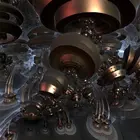Posted by Saint_Cuthbert in OpSec (edited by a moderator )
Quantum computers are based on the phenomena of quantum mechanics, as opposed to familiar classical computers based on transistors which encode data into binary digits (bits). In traditional computing, this process always leads to one of two possible states (0 or 1). [1] However, quantum computation relies on qubits that can express many different states simultaneously ("superpositions"), meaning that when/if this technology is fully developed, it will be capable of solving some types of mathematical problems virtually instantaneously. [2] [3]
Assembling a quantum computer is now an engineering problem rather than one impeded by laws of physics -- a theoretically imperfect machine can still yield useful results. Military and government agencies have invested heavily in this area because of the implications for today's widely used public-key cryptography. [4] Ciphertext that is invulnerable to classical computing will be shredded into ribbons by a large-scale quantum computer. Similarly, all Tor traffic will be vulnerable until quantum-resistant cryptography is implemented.
The Snowden documents reveal that all encrypted data traversing the internet is intercepted and stored indefinitely for cryptanalysis should there be a scientific breakthrough. A global arms race has ensued between the United States, EU, Russia, China, Israel and other global powers due to the immense geo-political, economic, intelligence and military advantages this technology would confer.
The academic and corporate consensus is that a large quantum computer will be built in around 10-15 years. It is safe to assume that well-funded intelligence communities are capable of greatly reducing this development period.
As of July 2020, the second round of NIST PQ cipher standardization has concluded. The 26 candidates are grouped into finalist and alternate groups which will be reviewed for another 12-18 months. NIST plans to release the initial standard for quantum-resistant cryptography in 2022. The finalist group has better performance, but less security confidence while alternate candidates have a stronger security rationale, but lack performance for all use cases. Only one cipher of each design type will be standardized, for example one lattice based asymmetric crypto and one lattice based signature scheme will be selected out of the group. A fourth round looking at alternates for standardization is planned.
Source: www.kicksecure.com/wiki/PQCrypto
 Post-Quantum Cryptography (PQCrypto)
Post-Quantum Cryptography (PQCrypto)
NotQball wrote (edited by a moderator )
One of these days, maybe you can post a tutorial for i2p with KickSecure. For some reason that OS did not agree with me and commited suicide.
There is a EEE standard, NIST standard and I speculate there is a DIN (German) standard for this situation. For a while there was even a YubiKey for that but it disapear from the market. I was stupid enough to have a known acolite order it for me and arrived backdoored and damaged. Quantum computers have been around since at least late 1980's and were called TriState. Some people were recruiting at that time to work in that field.
The TriState computers were used extensively by US spies but once the Soviets fell the rusky started to sell the location data (unique electromagnetic signature) and the need for Tor ensued. The last failed attempt to use TriState for spies was the Turkey coup against Erdogan. That is how Turkey knew the "exact" location of the participants and most likely the names (Gyudem or something was the leader).
Currently a lot of US government employees and contractors use a Quantum boot. USB key that allows a regular computer to be booted externally from a TriState computer. You do NOT want to use that crap from your home... It is open season after from China-man, Ruskies etc. I do know of some sorry ass cases of people who make environment assessments or pollution assessments that MADE THAT BIG MISTAKE.
If you have that KickSecure tutorial for I2P that does NOT endanger your activities please post it.